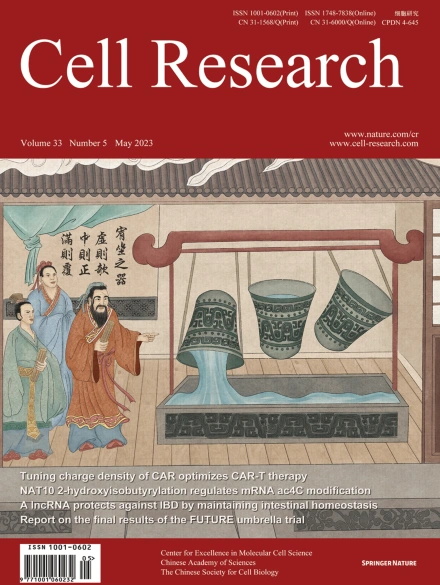
Advanced Search
Submit Manuscript
Advanced Search
Submit Manuscript
Volume 33, No 5, May 2023
ISSN: 1001-0602
EISSN: 1748-7838 2018
impact factor 17.848*
(Clarivate Analytics, 2019)
Volume 33 Issue 5, May 2023: 341-354 |
Tuning charge density of chimeric antigen receptor optimizes tonic signaling and CAR-T cell fitness
Jian Chen1,2,† , Shizhen Qiu1,† , Wentao Li1,8,† , Kun Wang1 , Yu Zhang3 , Han Yang1 , Baichuan Liu1 , Guangfei Li2 , Li Li1 , Min Chen2 , Junjie Lan4 , Jiahua Niu5 , Peijie He2 , Lei Cheng2 , Gaofeng Fan1 , Xin Liu3 , Xianmin Song5,* , Chenqi Xu3,6,* , Haitao Wu2,* , Haopeng Wang1,7,*
1School of Life Science and Technology, ShanghaiTech University, Shanghai, ChinaTonic signaling of chimeric antigen receptor (CAR), i.e., the spontaneous CAR activation in the absence of tumor antigen stimulation, is considered to be a pivotal event controlling CAR-T efficacy. However, the molecular mechanism underlying the spontaneous CAR signals remains elusive. Here, we unveil that positively charged patches (PCPs) on the surface of the CAR antigen-binding domain mediate CAR clustering and result in CAR tonic signaling. For CARs with high tonic signaling (e.g., GD2.CAR and CSPG4.CAR), reducing PCPs on CARs or boosting ionic strength in the culture medium during ex vivo CAR-T cell expansion minimizes spontaneous CAR activation and alleviates CAR-T cell exhaustion. In contrast, introducing PCPs into the CAR with weak tonic signaling, such as CD19.CAR, results in improved in vivo persistence and superior antitumor function. These results demonstrate that CAR tonic signaling is induced and maintained by PCP-mediated CAR clustering. Notably, the mutations we generated to alter the PCPs maintain the antigen-binding affinity and specificity of the CAR. Therefore, our findings suggest that the rational tuning of PCPs to optimize tonic signaling and in vivo fitness of CAR-T cells is a promising design strategy for the next-generation CAR.
https://doi.org/10.1038/s41422-023-00789-0